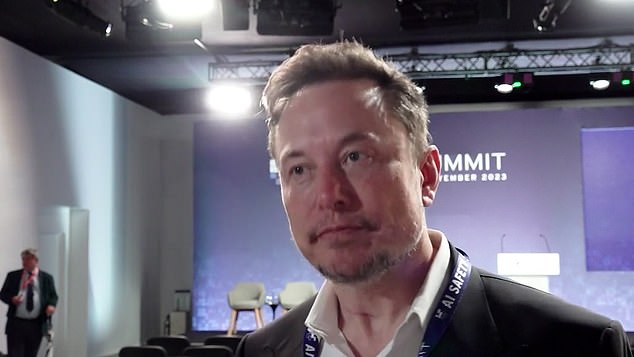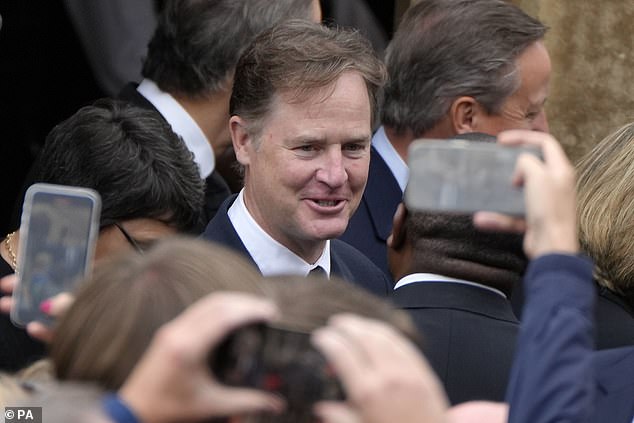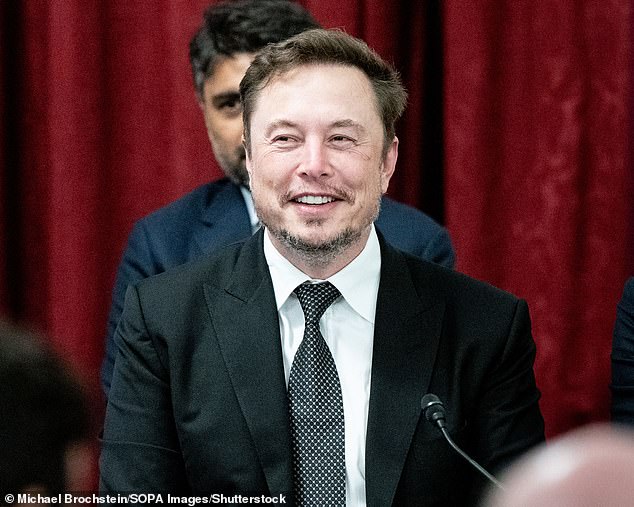Elon Musk warns AI poses ‘one of the biggest threats to humanity’ at Bletchley Park summit… but Meta’s Nick Clegg says the dangers are ‘overstated’
Artificial Intelligence poses ‘one of the greatest threats’ to humanity, Elon Musk warned yesterday.
The billionaire tech entrepreneur’s fears were echoed by delegates from around the world at the UK AI Safety Summit at Bletchley Park in Buckinghamshire.
Leading countries – including the US and China – yesterday signed a ‘historic’ agreement pledging to protect the world from the technology’s potential for ‘catastrophic’ damage. Yet not all summit participants seemed to share these fears.
Former Lib Dem leader Sir Nick Clegg, now president of global affairs at Meta, the owner of Facebook, Instagram and WhatsApp, said the risk of AI to humanity was “exaggerated”.
He said “many” within the sector agreed with him and urged governments not to “micro-manage” tech companies through legislation. And he compared concerns about the dangers of artificial intelligence to the “moral panic” over video games in the 1980s.
The clash between the two technology heavyweights comes amid a wider debate over AI within the industry over whether to prioritize safety or the development of lucrative new products.

Elon Musk’s fears were echoed by delegates from around the world at the UK AI Safety Summit at Bletchley Park in Buckinghamshire.

Former Lib Dem leader Sir Nick Clegg (pictured), now president of global affairs at Meta, the owner of Facebook, Instagram and WhatsApp, said the risk of AI to humanity was ‘exaggerated’
More than 1,000 tech chiefs, experts and academics signed an open letter earlier this year warning of a “dangerous” arms race to create the most advanced model.
Rishi Sunak organized the two-day summit at Bletchley Park, home of the code-breaking heroes of the Second World War, in a bid to show that Britain can lead the world in regulating artificial intelligence.
Yesterday, Technology Minister Michelle Donelan announced that the 28 participating countries had signed an agreement to work together to protect against the threat of AI, called the ‘Bletchley Declaration’ in a political coup for Britain.
Although not detailed, the report stated that all involved agreed that the technology “offered the potential for serious, even catastrophic harm, whether intentional or unintentional.”
Addressing the summit in a video message yesterday, King Charles called AI “no less important” than the discovery of fire, but said it was the duty of delegates to protect people’s livelihoods and protect our democracies from the “significant risks’ it entailed.
A government newspaper published last week predicted that AI would make the world a much more dangerous place over the next eighteen months, enabling more sophisticated cyber attacks, fueling fake news and misinformation online and making it much easier for terrorists to create radioactive weapons .
The report warned that the increasingly powerful technology could even eventually convince people to hand over control, leading to potentially “catastrophic and permanent” consequences.
While several world leaders turned down Britain’s invitations to the summit, Musk took center stage when he arrived from Silicon Valley. Despite his reputation for a confrontational style, one attendee said the tech boss played a “big role in every session.”
Yesterday, during a break between sessions, Musk told reporters that he believed AI was an “existential risk” because for the first time humans were confronted with something “that will be much more intelligent than us.”

Mr Musk told reporters he believed AI was an “existential risk” because for the first time humans were confronted with something “that will be much more intelligent than us”
“It’s not clear to me that we can control something like that, but I think we can strive to steer it in a direction that is beneficial to humanity,” he said.
“But I do think it’s one of the existential risks we face, and it’s potentially the most pressing when you look at the timescale and pace of progress. The summit is timely, and I applaud the Prime Minister for holding it.”
Mr Musk – who will hold a one-on-one conversation with Mr Sunak today, which will be broadcast on to monitor AI labs and ‘sound the alarm’ if their models were dangerous.
His warnings were in stark contrast to the position of Sir Nick, the former deputy prime minister, who played down the intelligence of the technology in an interview with the BBC.
AI systems were nothing more than “gigantic auto-complete systems” that “know nothing about themselves,” he claimed.
Meta is developing its own incredibly powerful AI ‘chatbot’ for Facebook, Instagram and WhatsApp.
Last night, former culture secretary Nadine Dorries, who oversaw crucial legislation aimed at reining in Big Tech during her time in parliament, accused Mr Clegg of misleading the public about his concerns about AI.
She said: ‘He will say whatever it takes to minimize the legislation against Meta and prevent them from making the maximum amount of money. He sold his soul.’
Imran Ahmed, CEO of the Center for Countering Digital Hate, said: ‘It is extraordinary that Facebook has caused so much harm, from harming the mental health of our children to spreading hate and misinformation in our society, and is now telling us that we shouldn’t do that. concerned about a technology that so many are warning about.
“I’m sure the British people have learned by now not to trust anything that comes out of Nick Clegg’s mouth.”
A spokesperson for Meta said that Sir Nick has made ‘very clear the need for regulation in the right areas’, and the ‘need to focus on immediate challenges such as how AI could be used in next year’s election’, and not just on ‘futuristic predictions that may not be realized’.
